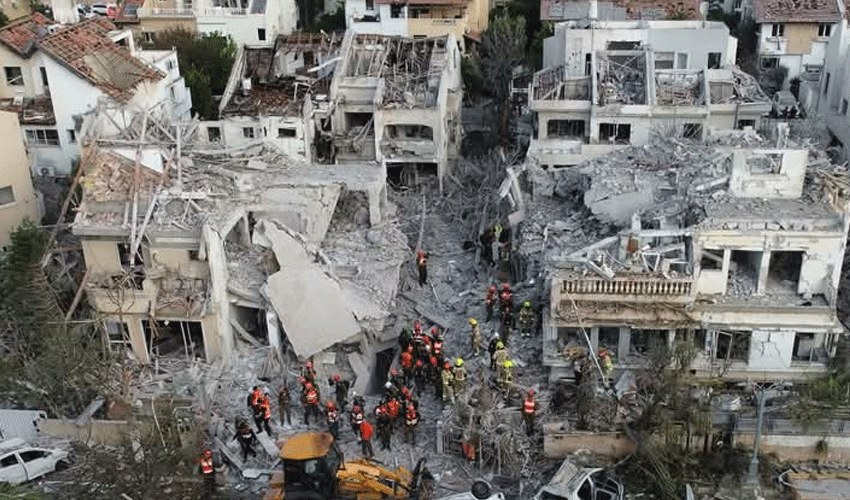June 13, 2025 — The aftershocks of Iran’s historic missile barrage on Israel continue to ripple across the region. Nearly two months after Iran launched over 120 ballistic and cruise missiles targeting Israeli cities and military sites, the Impact of Iran Missile Strikes on Israel’s Cities remains severe and far-reaching. Civilian life is deeply disrupted, critical infrastructure damaged, and fears of a broader regional war loom large.
Impact of Iran Missile Strikes on Israel’s Cities – June 13, 2025 Update Legal Point
Middle East Conflict Intensifies Amid Ongoing Iran-Israel Missile Exchange
New Developments Since April Strikes
Since the April 2025 missile attack, tensions between Iran and Israel have escalated further. On June 11, Israeli defense forces confirmed new retaliatory drone and airstrikes on suspected IRGC-linked sites in Syria and Lebanon. Iran, in turn, has kept its ballistic units on high alert.
June 13 reports from Tel Aviv and Jerusalem show continued damage assessment and repair efforts underway, but full recovery remains distant. Casualties have risen to over 260, including both civilians and military personnel from both sides.
Which Israeli Cities Were Affected Most?
The impact of Iran missile strikes on Israel’s cities has left multiple urban centers shaken:
- Tel Aviv: Still grappling with the aftermath. Emergency services report over 1,000 buildings affected, with 60 severely damaged.
- Jerusalem: Telecommunications remain partially down in eastern districts. Temporary shelters house hundreds of displaced families.
- Haifa: Industrial port activities are partially resumed, but export delays continue.
- Ashkelon and Be’er Sheva: Schools remain closed; residents report power outages and increased military presence.
Israel’s Military and Political Response
Israel’s Defense Ministry states that over 85% of incoming missiles were intercepted using the Iron Dome and David’s Sling systems. Still, officials admit that the scale and coordination of Iran’s missile attack was unprecedented.
Prime Minister Benjamin Netanyahu addressed the nation again on June 12, vowing that “Israel will respond at the time and place of its choosing,” hinting at further military operations.
Israel has now activated thousands of reservists and deployed defense assets along its northern and central borders.
Iran’s Justification and Current Stance
Iran maintains its position that the April missile strike was a “measured response” to the bombing of its diplomatic consulate in Damascus. The Iranian Revolutionary Guard (IRGC) warned on June 10 that “any future Israeli aggression will be met with a wider and stronger response.”
Tehran also emphasized that civilian targets were avoided, but acknowledged that collateral damage was “regrettable yet inevitable in such high-conflict environments.”
Impact on Civilians: Humanitarian Concerns Mounting
The civilian cost of the missile exchange has drawn sharp criticism from global humanitarian groups.
- Hospitals in Tel Aviv and Be’er Sheva report overcrowding and shortage of supplies.
- Schools, malls, and transportation systems remain partially shut across major cities.
- Mental health hotlines are overwhelmed, with citizens reporting symptoms of trauma and anxiety.
UN agencies have issued appeals for calm, stressing that “civilians are paying the price for political aggression.”
Global Reactions – Pressure for Peace Intensifies
On June 13, the United Nations Security Council held an emergency session. A joint resolution is being drafted calling for:
- Immediate ceasefire
- Reopening of diplomatic communication channels
- Investigation into the legality of the Damascus strike and Iran’s retaliation
The U.S., France, Russia, and China continue behind-the-scenes diplomacy, while Saudi Arabia and Turkey have offered to mediate.
Economic and Strategic Impact
The Middle East conflict’s impact extends far beyond the battlefield:
- Global energy markets have become unstable due to an 18% increase in oil prices since April, and
- airlines have redirected aircraft out of Iranian and Israeli airspace.
- Foreign investment in both nations has plummeted as global firms seek stability.
Military analysts warn that if escalation continues, the conflict might drag in regional players like Lebanon, Iraq, or even NATO members.

Legal Perspective: Proportionality and Sovereignty
Under international law, Iran frames its attack as self-defense under Article 51 of the UN Charter. However, Israel and its allies argue the Damascus strike was a pre-emptive act against intelligence threats.
The impact of Iran missile strikes on Israel’s cities raises pressing legal questions:
- Did both sides observe the principle of proportionality?
- Were civilians adequately protected?
- Have war crimes occurred?
International legal experts call for an independent fact-finding mission to ensure accountability on both sides.
Frequently Asked Questions (FAQs)
Q1: Why did Iran strike Israel in 2025?
In retaliation for the Israeli bombing of Iran’s consulate in Damascus, which killed senior Iranian military officials.
Q2: What cities in Israel were affected?
Tel Aviv, Jerusalem, Haifa, Ashkelon, and Be’er Sheva saw direct impacts.
Q3: How many missiles did Iran fire?
Over 120 ballistic and cruise missiles were launched during the April attack.
Q4: Has the conflict ended?
No. While large-scale missile exchanges have paused, tensions remain high with continuous border skirmishes and counterstrikes.
Q5: What is the international stance?
Most global powers urge de-escalation and call for both parties to return to diplomacy and comply with international law.
Conclusion: A Critical Turning Point
As of June 13, 2025, the impact of Iran missile strikes on Israel’s cities has left deep scars on the region — both physical and psychological. While both nations remain defiant, the world watches anxiously. The future of Middle Eastern peace may depend on how these two powers choose their next steps.
Legal experts, humanitarian agencies, and global leaders alike are calling for accountability, peace, and protection of innocent lives.
Will diplomacy prevail — or will history repeat itself with another devastating war?
Follow us on Social Media: Legal Point



